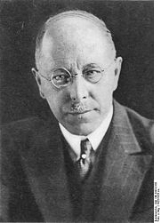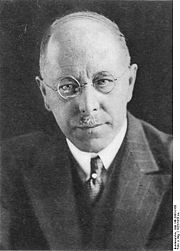
Carl Heinrich Becker
Encyclopedia

Germany
Germany , officially the Federal Republic of Germany , is a federal parliamentary republic in Europe. The country consists of 16 states while the capital and largest city is Berlin. Germany covers an area of 357,021 km2 and has a largely temperate seasonal climate...
scholar on Islam
Islam
Islam . The most common are and . : Arabic pronunciation varies regionally. The first vowel ranges from ~~. The second vowel ranges from ~~~...
, with many articles in the first edition of the Encyclopaedia of Islam
Encyclopaedia of Islam
The Encyclopaedia of Islam is an encyclopaedia of the academic discipline of Islamic studies. It embraces articles on distinguished Muslims of every age and land, on tribes and dynasties, on the crafts and sciences, on political and religious institutions, on the geography, ethnography, flora and...
to his credit. As a politician he was minister of culture and education in the state of Prussia
Prussia
Prussia was a German kingdom and historic state originating out of the Duchy of Prussia and the Margraviate of Brandenburg. For centuries, the House of Hohenzollern ruled Prussia, successfully expanding its size by way of an unusually well-organized and effective army. Prussia shaped the history...
.
Becker was born in Amsterdam
Amsterdam
Amsterdam is the largest city and the capital of the Netherlands. The current position of Amsterdam as capital city of the Kingdom of the Netherlands is governed by the constitution of August 24, 1815 and its successors. Amsterdam has a population of 783,364 within city limits, an urban population...
. The son of a banker, Becker attended universities at Lausanne
Lausanne
Lausanne is a city in Romandy, the French-speaking part of Switzerland, and is the capital of the canton of Vaud. The seat of the district of Lausanne, the city is situated on the shores of Lake Geneva . It faces the French town of Évian-les-Bains, with the Jura mountains to its north-west...
, Heidelberg
Heidelberg
-Early history:Between 600,000 and 200,000 years ago, "Heidelberg Man" died at nearby Mauer. His jaw bone was discovered in 1907; with scientific dating, his remains were determined to be the earliest evidence of human life in Europe. In the 5th century BC, a Celtic fortress of refuge and place of...
, and Berlin
Berlin
Berlin is the capital city of Germany and is one of the 16 states of Germany. With a population of 3.45 million people, Berlin is Germany's largest city. It is the second most populous city proper and the seventh most populous urban area in the European Union...
, and travelled abroad in Spain
Spain
Spain , officially the Kingdom of Spain languages]] under the European Charter for Regional or Minority Languages. In each of these, Spain's official name is as follows:;;;;;;), is a country and member state of the European Union located in southwestern Europe on the Iberian Peninsula...
, the Sudan, Greece
Greece
Greece , officially the Hellenic Republic , and historically Hellas or the Republic of Greece in English, is a country in southeastern Europe....
, and Turkey
Turkey
Turkey , known officially as the Republic of Turkey , is a Eurasian country located in Western Asia and in East Thrace in Southeastern Europe...
before earning his doctorate in 1899. He was granted the title of Professor
Professor
A professor is a scholarly teacher; the precise meaning of the term varies by country. Literally, professor derives from Latin as a "person who professes" being usually an expert in arts or sciences; a teacher of high rank...
in 1906.
In 1902, Becker became a privatdozent for semitic philology
Philology
Philology is the study of language in written historical sources; it is a combination of literary studies, history and linguistics.Classical philology is the philology of Greek and Classical Latin...
at the University of Heidelberg
Heidelberg
-Early history:Between 600,000 and 200,000 years ago, "Heidelberg Man" died at nearby Mauer. His jaw bone was discovered in 1907; with scientific dating, his remains were determined to be the earliest evidence of human life in Europe. In the 5th century BC, a Celtic fortress of refuge and place of...
. After the completion of his habilitation
Habilitation
Habilitation is the highest academic qualification a scholar can achieve by his or her own pursuit in several European and Asian countries. Earned after obtaining a research doctorate, such as a PhD, habilitation requires the candidate to write a professorial thesis based on independent...
, he was appointed Professor of History
History
History is the discovery, collection, organization, and presentation of information about past events. History can also mean the period of time after writing was invented. Scholars who write about history are called historians...
and Culture
Culture
Culture is a term that has many different inter-related meanings. For example, in 1952, Alfred Kroeber and Clyde Kluckhohn compiled a list of 164 definitions of "culture" in Culture: A Critical Review of Concepts and Definitions...
of the Orient
Orient
The Orient means "the East." It is a traditional designation for anything that belongs to the Eastern world or the Far East, in relation to Europe. In English it is a metonym that means various parts of Asia.- Derivation :...
at the Kolonialinstitut and Director of the Seminar for History and Culture of the Orient in Hamburg
Hamburg
-History:The first historic name for the city was, according to Claudius Ptolemy's reports, Treva.But the city takes its modern name, Hamburg, from the first permanent building on the site, a castle whose construction was ordered by the Emperor Charlemagne in AD 808...
. In 1910 he took over the editorship of Der Islam, the journal for the history and culture of the islamic orient. In 1913 he moved to Bonn
Bonn
Bonn is the 19th largest city in Germany. Located in the Cologne/Bonn Region, about 25 kilometres south of Cologne on the river Rhine in the State of North Rhine-Westphalia, it was the capital of West Germany from 1949 to 1990 and the official seat of government of united Germany from 1990 to 1999....
, where he was a Professor of Oriental Philology.
In his time in Heidelberg CHB met Max Weber
Max Weber
Karl Emil Maximilian "Max" Weber was a German sociologist and political economist who profoundly influenced social theory, social research, and the discipline of sociology itself...
. Becker became later together with Martin Hartmann one of the first who introduced modern sociological thinking into Islamic studies. He was an opponent of the Kulturkreistheorie (theory of cultural circles) of Ernst Troeltsch
Ernst Troeltsch
Ernst Troeltsch was a German Protestant theologian and writer on philosophy of religion and philosophy of history, and an influential figure in German thought before 1914...
.
During the First World War, Becker began his work with the Prussian Ministry of Culture, and after the war he was promoted to State Secretary and, eventually, to the position of Prussian Minister for Science, Art, and People's Education. He died in Berlin.
Works
- Ibn Gauzi's Manaqib Omar Ibn' Abdelaziz (Dissertation, 1899)
- Beitrage zur Geschichte Agyptens unter dem Islam (2 vols., 1902- 1903)
- Papyri Schott-Reinhardt: Veroffentlichungen aus der Heidelberger Papyrus‐ Sammlung, Vol. 1 ( 1906)
- Der Kanzel im Kultus des alten Islam (1906)
- Christentum und Islam (1907)
- L'Islam et la Colonisation de l'Afrique (1910)
- Gedanken zur Hochschulreform (1919)
- Kulturpolitische Aufgaben des Reichs (1919)
- Kant und die Bildungskrise der Gegenwart (1924)
- Islamstudien: Vom Werden und Wesen der islamischen Welt (2 vols., 1924- 1932)
- Vom Wesen der deutschen Universitaet (1925)
- Die preussische Kunstpolitik und der Fall Schilling (1925)
- Die Paedagogische Akademie im Aufbau unseres nationalen Bildungswesens (1926)
- Zu Beethovens 100. Todestag (1927)
External links
-
- (trans. Rev. H. J. Chaytor)

